| Srl | Item |
| 1 |
ID:
166090


|
|
|
|
|
| Summary/Abstract |
This article describes attempts in Chinese legal scholarship to produce indigenised forms of jurisprudence. These attempts are partly animated by an ethos of anti-formalism and the assumption that Chinese legal thought and the Chinese approach to adjudication are more flexible and more responsive to social concerns than (Western) legal formalism. Interestingly, prominent currents of European and American jurisprudence have made use of similar anti-formalist arguments since the beginning of the twentieth century. The anti-formalist impulse and the calls to indigenise Chinese jurisprudence are therefore best understood as performative strategies that support specific ideological projects, such as the effort to legitimise China’s political status quo.
|
|
|
|
|
|
|
|
|
|
|
|
|
|
|
|
| 2 |
ID:
124708
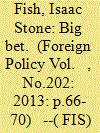

|
|
|
|
|
| Publication |
2013.
|
| Summary/Abstract |
THE TAIWANESE ISLANDS of Matsu do not seem like an ideal spot for one of the world's biggest casinos. Although they are ringed by rocky beaches and azure water, only about 10,000 people live on the 19 tightly clustered flyspecks, some 126 miles away from the main island Taiwan. An Associated Press reporter who visited in 2012 described Matsu's few shops as "a complex of decaying concrete structures that are most notable for their low-wattage gracelessness." Besides a small tourism industry, the islands' chief draw is sorghum-based liquor that, to the uninitiated, smells like embalming fluid.
|
|
|
|
|
|
|
|
|
|
|
|
|
|
|
|
| 3 |
ID:
128283
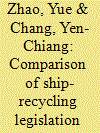

|
|
|
|
|
| Publication |
2014.
|
| Summary/Abstract |
This article discusses the Chinese legal framework in relation to ship recycling and suggests that the various legislation, standards, and opinions provide disorderly and nosystematic regulation. A uniform law specifically regulating the ship-recycling industry should be adopted by China, with a single competent authority empowered to supervise ship-recycling activities, that will effectively implement the 2009 Hong Kong International Convention for the Safe and Environmentally Sound Recycling of Ships.
|
|
|
|
|
|
|
|
|
|
|
|
|
|
|
|
| 4 |
ID:
114494


|
|
|
|
|
| Publication |
2012.
|
| Summary/Abstract |
Forum non conveniens is a popular doctrine in common law jurisdictions but it is generally unacceptable in civil law. Historically, China is a country of civil law tradition and Chinese law accordingly does not recognize this doctrine. Nevertheless, this doctrine has gradually attracted more and more Chinese lawyers' attention and been de facto applied by some Chinese courts in the past decades. A systematic survey of Chinese courts' practice, however, demonstrates that compared with those in the United States and United Kingdom, the Chinese version of this doctrine is quite limited, which is consistent with the Chinese jurisdictional background and judicial reality. Looking to the future, this doctrine should be formally accepted by Chinese law and more details on its application need be worked out.
|
|
|
|
|
|
|
|
|
|
|
|
|
|
|
|
| 5 |
ID:
166096
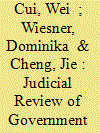

|
|
|
|
|
| Summary/Abstract |
The judicial review of government actions is often used as a bellwether of the government’s attitude towards the rule of law in China. Accordingly, in gauging the direction of legal reform in the Xi era, media reports have highlighted changes in litigation against government agencies as evidence of positive movement towards greater rule of law. We provide a selective review of changes in China’s administrative litigation system in the last few years, giving special attention to the amendment in 2014 of the Administrative Litigation Law (ALL), and a 2018 Supreme People’s Court Interpretation of the same statute. In our view, the question of whether lawsuits might be brought against the government has arguably been superseded in importance by the question of how courts will decide such lawsuits. And the generic notion of judicial independence itself no longer sheds sufficient light on actual and possible judicial responses. Using the purportedly expanded scope of review of informal policy directives as an example, we show that symbolism-motivated advocacy to improve the administrative litigation in China may come at the expense of protecting the non-symbolic functions of judicial review, e.g., the coherence of law and consistency in the delivery of justice.
|
|
|
|
|
|
|
|
|
|
|
|
|
|
|
|
| 6 |
ID:
115846
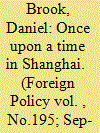

|
|
|
| 7 |
ID:
129449
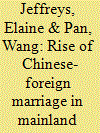

|
|
|
|
|
| Publication |
2013.
|
| Summary/Abstract |
This research note examines the growth of Chinese-foreign marriage in mainland China since 1979. From the founding of the People's Republic of China (PRC) in 1949 until the early 1990s, Chinese-foreign marriage was an unusual occurrence in the country. Statistics compiled by the PRC's Ministry of Civil Affairs indicate that the number of couples registering a Chinese-foreign marriage in mainland China increased almost tenfold between 1979 and 2010, although that figure has since stabilized at a lower rate. The article explores these changes in three stages. First, it maps the architecture of the PRC's Marriage Laws and reform-era regulations on marriage registration, showing how Chinese-foreign marriages have been categorized as different types of 'cross-border' and international marriages. Second, it provides a statistical breakdown of the number, type and gendered composition of Chinese-foreign marriages registered in mainland China between 1979 and 2010. It concludes by highlighting the gendered character and spatial dimensions of mainland Chinese-foreign marriages, and pointing to their largely 'intracultural' as opposed to international bases.
|
|
|
|
|
|
|
|
|
|
|
|
|
|
|
|